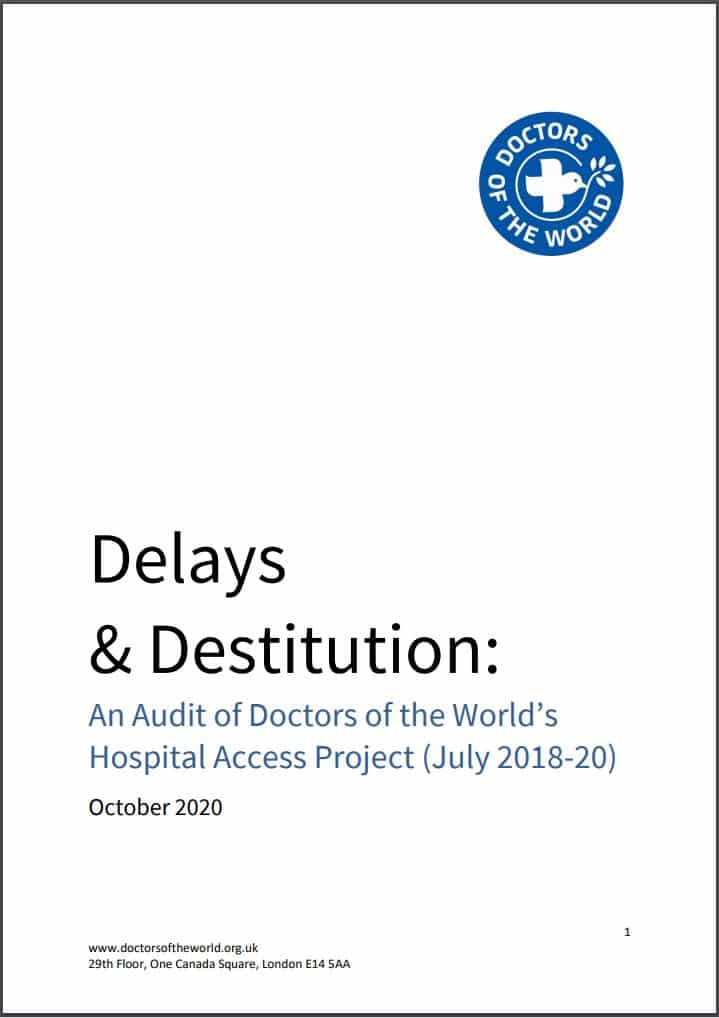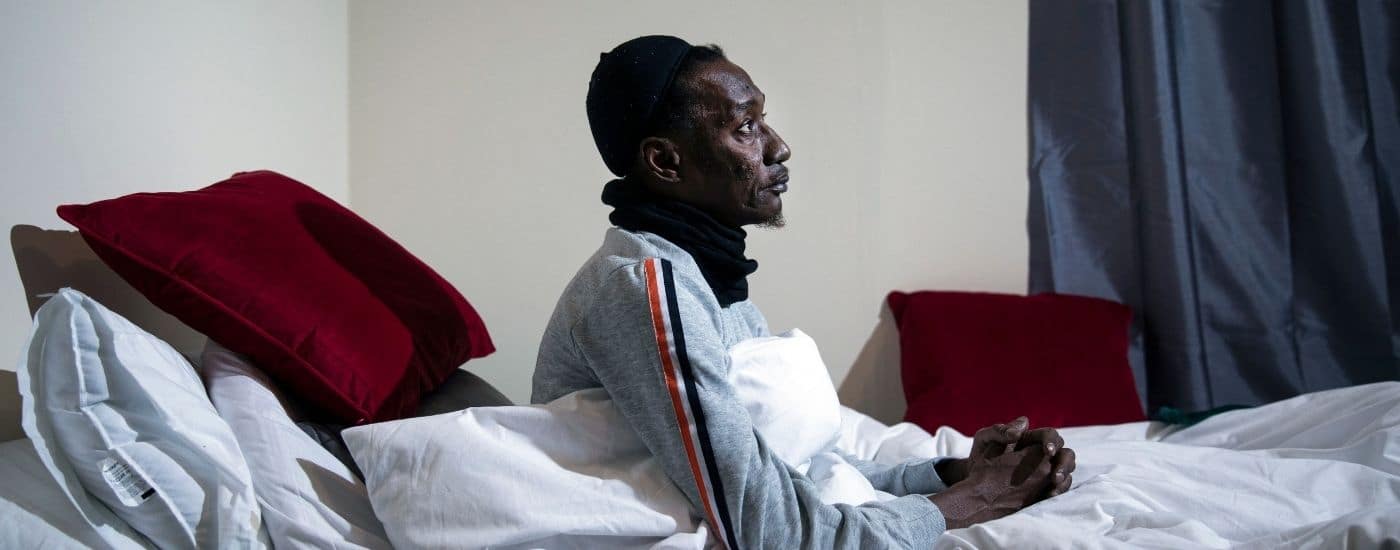Press release: New report reveals the devastating impact of NHS charging on migrants in vulnerable circumstances
Published 14th October 2020
Migrants living in extremely vulnerable circumstances in England are waiting up to 224 weeks to receive medical care because of laws forcing hospitals to carry out immigration checks and withhold care from patients deemed not eligible for free NHS treatment – even when the patient has no income, or the upfront payment would push them into severe debt or further poverty.
A new report by Doctors of the World UK (DOTW) reveals medical care charges are being applied to those least able to pay – people who are homeless, destitute, and already struggling to meet their basic needs – as well as those with a legal barrier to removal from the UK, which means the patient cannot travel to another country to seek treatment. Read the full report here.
This is leading to lengthy treatment delays for migrants already living in extremely vulnerable circumstances, including those with life-threatening or serious health conditions who are having ‘immediately necessary’ or ‘urgent’ NHS services withheld for months and, in some cases, years.
Titled Delays and Destitution: An Audit of Doctors of the World’s Hospital Access Project (July 2018-20), the report provides quantitative data on the NHS charging policy for the first time and sheds light on the catastrophic consequences of charging migrants for healthcare.
“The report lays bare the true impact of the NHS patient charging policy on patients. Put simply, those who cannot afford to pay have to go without treatment, however desperately they need it,” said Anna Miller, report author and DOTW’s Head of Policy and Advocacy.
“It shows that all the safeguards put in place to ensure urgent medical care is provided regardless of a person’s ability to pay aren’t working, and patients suffer for months, sometimes years, on end, alone.”
To prepare the report, DOTW carried out an audit of service user data collected by caseworkers delivering the charity’s Hospital Access Project between July 2018 and July 2020. The Hospital Access Project provides specialist casework support and legal advice to people refused NHS hospital care or non-primary care-related NHS services in the community due to their immigration status in the UK and as a result of the NHS charging regulations.
Twenty-seven DOTW service users aged four to 75 years old were involved in the audit. The majority (44.4% or 12/27) had a ‘refused asylum claim’ and 37% (10/27) of service users had an outstanding human rights or asylum application, or appeal. Nearly half (44.4% or 12/27) of service users could not be removed from the UK due to an outstanding legal case.
The audit also found:
- The NHS charging policy is being applied to destitute individuals with no realistic prospects of being able to pay for the NHS services they receive. Nearly all the service users (96.3%) accessing the project were destitute and unable to meet their basic needs.
- The NHS charging policy is delaying patients’ access to NHS services. The average length of delay was 37.3 weeks from the point of diagnosis (rather than GP referral) – more than twice the NHS target time.
- Approximately 60% (59.9%) of service users faced delays of over six months, with the longest delay recorded extending to over four years (224 weeks). Those requiring either an urgent or immediately necessary NHS service faced a delay of 36 weeks on average, with the longest delay in receiving treatment at 135 weeks or 2.5 years.
- Urgent and immediately necessary NHS services are also being incorrectly withheld from individuals who could not reasonably be expected to leave the UK to receive treatment elsewhere. This indicates the charging policy is too complex for NHS trusts to apply correctly and many NHS trusts are failing to correctly assess when an individual can reasonably be expected to leave the UK.
Ms Miller said charging for medical care risks leaving unwell people exposed and without healthcare.
“This report shows that in the UK, medical care charges are being applied to those least able to pay – people who are homeless and destitute, people who already struggle to afford to feed themselves,” she said. “At best, the NHS charging policy is problematic, unworkable in practice, and a poor use of NHS resources. At worst, it is reckless and a threat to patient and public health, and the UK’s commitments to achieve universal healthcare coverage.”
Ms Miller said the Hospital Access Project audit adds compelling evidence to the urgent calls from the Hands Up for Our Health campaign – launched last week by DOTW, Lancet Migration and the Faculty for Public Health – for an immediate suspension of the NHS charging regulations. Over 50 organisations have joined the coalition calling for urgent investigation and reform, and improved access to all NHS services, during COVID-19 and beyond.
“During a global pandemic, we really need every person and every family to feel safe to go forward to NHS services – including COVID-19 testing services – without the risk of financial or legal consequences,” she said.
Based on the findings of the Hospital Access Project audit, DOTW makes the following recommendations to reform the healthcare entitlement policy to ensure the UK meets its commitments to achieve universal healthcare coverage and upholds its human rights obligations. These should be urgently adopted to address the issues identified in the report and to prevent unnecessary treatment delays and patient suffering.
1. Change the definition of ‘ordinarily resident’ to include all individuals living or resident in the UK regardless of immigration status.
2. Introduce an exemption for individuals on low, or no, income.
3. Establish an independent, transparent process whereby individuals can challenge the decisions made by NHS trusts under the charging regulations and resolve cases within two weeks
You can view the full report below.

For more information or to arrange interviews, please contact Kimberley Vlasic at KVlasic@doctorsoftheworld.org.uk.
